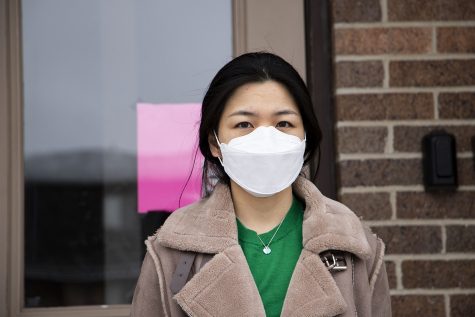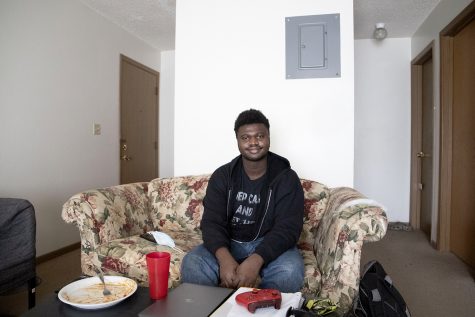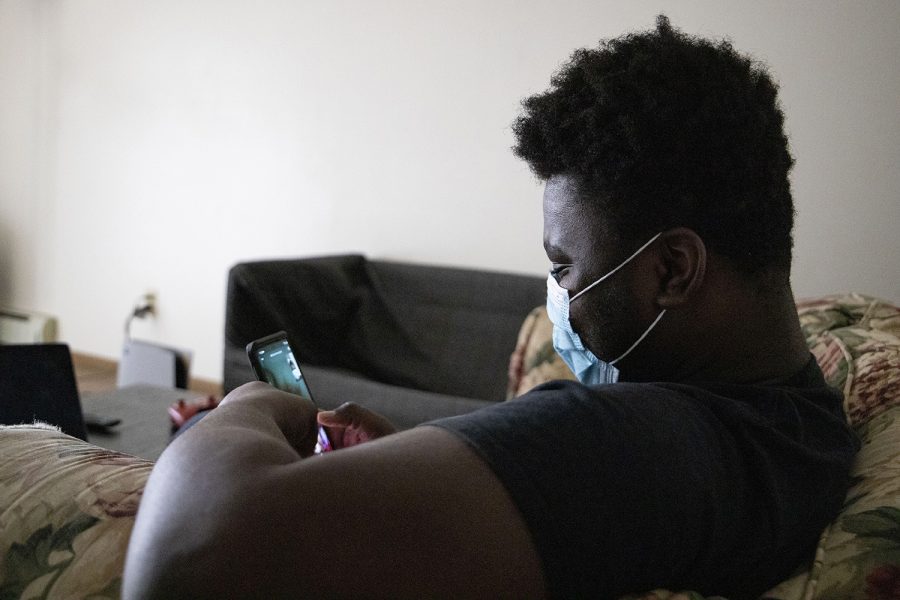International Programs expects a ‘gradual’ return to normal starting this fall
It will take time for international-student enrollment to return to its normal frequency and volume, experts predict, as vaccines are doled out throughout the world.
University of Iowa sophomore Joslin Some video chats with his younger sister on Saturday, March 14, 2021 at his apartment in Iowa City. Some is an international student from Ouagadougou, the capital of Burkina Faso in West Africa. His sister calls often, he says, and they often speak in a combination of English and French over the phone. (Jenna Galligan/The Daily Iowan)
March 16, 2021
Last spring, Yeji Son was preparing to go home to South Korea for the summer break, hoping that COVID-19 limitations would dwindle by then. A year later, she’s barely left her 750-square-foot, two-bedroom apartment in Coralville.
Son is one of 2,072 international students who enrolled at the University of Iowa this fall. Iowa’s public universities have seen significant drops in international student enrollment in the last few years, which was exacerbated by the pandemic.
Although International Programs has offered plenty of support, Son said some international students still feel disconnected from campus in addition to their home countries.
“International students are just struggling in their own cave,” Son said. “I think it’s better if they have a roommate or partner, but I know some international students have a really difficult time because of the feelings [of] isolation.”
Son, a third-year international student in the counseling psychology Ph.D. program, had to stay in the U.S. throughout the pandemic because of a lack of funds. She hasn’t traveled home to South Korea since the summer of 2019.
With widespread vaccination continuing across the U.S., UI International Programs is envisioning what the future of international-student enrollment, and global programming will look like in the coming years.
In an email to The Daily Iowan, Michael Bortscheller, associate director of the UI International Student and Scholar Services, said the future for the program isn’t yet clear as the dust settles from the COVID-19 pandemic dampening international student enrollment.
“Nothing is set in stone at this time, both because the situation with the pandemic can change and has changed rapidly and also because we need guidance from Federal Agencies regarding when or whether immigration regulations will go back to the way they were before 2020,” Bortscheller wrote.
While the pandemic has created challenges for everyone, Bortscheller wrote, international students have dealt with additional hurdles far away from their home countries.
“Some students had to face a decision about whether to remain in the U.S. and potentially go well over a year without seeing their families or to attempt to travel home and possibly find they couldn’t return to the U.S. to resume their studies due to the constantly changing travel restrictions from January to July of 2020,” Bortscheller wrote.

Class over Zoom can sometimes make it more difficult to understand English, Son, 29, said, and she has at times had to work harder when communicating with the class and teacher.
Some of her friends that opted to return home have struggled with the time difference, sleeping schedules, and tightened travel regulations, Son said.
Son said she doesn’t know if the international student experience at the UI will ever return to normal. With added tension between the U.S. and China, she also thinks some students who have already given up on making friendships and connections may opt to continue virtual learning if it is still an option.
Joslin Some, UI sophomore from Burkina Faso studying computer-science engineering had one normal semester in college before the pandemic changed everything.
Some said his experience at the UI has been a lot of fun, especially last year. This year, despite being cooped up in his apartment for much of the time since most of his fall and spring classes have been virtual, he said “it’s all right.”
The biggest change in Some’s life has been that many friends opted to stay home. Luckily, Some said he lives with one friend in an Iowa City apartment. Some wanted to travel home last summer but couldn’t because of international travel restrictions, he said, so he hasn’t been home since the day he left for college.

“Being away from home still is hard, but I’d be away either way.” Some said. “It’s just the fact that I never got to go back, that kind of hurts.”
Right now, Some is dealing with uncertainty in figuring out his future plans, deciding if he will pursue an internship in the U.S. or try to go home to see family and friends, something he said he’s looking forward to most once he feels safe enough to travel.
The international programs department is anticipating international-student enrollment to be down again as the U.S. emerges from the pandemic vaccinated and to continue to decline, said Russ Ganim, dean of International Programs.
According to the state Board of Regents, international student enrollment has declined 45 percent in the last 5 years –– matching national trends that were exacerbated by the pandemic.
International students made up 7.9 percent of the UI student population in fall 2019, but dropped to 6.5 percent in fall 2020, according to UI admissions data.
“It’s going to take a while before we rebuild our international-student numbers realistically speaking,” Ganim said. “I think it’s going to take anywhere from two to three years. “
The largest number of international students enrolled at the UI are from China, and the number of students from the country have been declining since the start of the Trump administration. Those declines are expected to continue, Ganim said.
International Programs is optimistic about the applicants and activities they are seeing in other pockets of the world, Ganim said, with encouraging signs from students hailing from Africa and the Middle East.
“So, there are other parts of the world, besides China that we will need to focus on,” Ganim said. “And India always presents opportunities.”
The process, Ganim said, will require patience.
“Our plan has been approved by senior administration to basically focus on new areas, new connections –– building deeper relationships than maybe we had before,” Ganim said. “And just making sure that we can establish pipelines with trusted partners in order to rebuild our international-student population.”
The plan also includes fostering partnerships with institutions in other countries and private high schools, Ganim noted.
Political uncertainty and a president that was not favorable to international students and scholars may have exacerbated the challenges of the pandemic. Ganim said, now that international programs are seeing a reversal in many of these policies, he thinks it will bode well for the future.
As for the end of the pandemic, Son said she is excited for social-distancing measures to end, because sometimes as an ethnic minority when people physically step away from her, she wonders if the reason is because she’s Asian.
“So, I think that is something that I am looking forward to, and of course, going direct to my home country, and enjoying the food there, and seeing my family and friends,” Son said.



